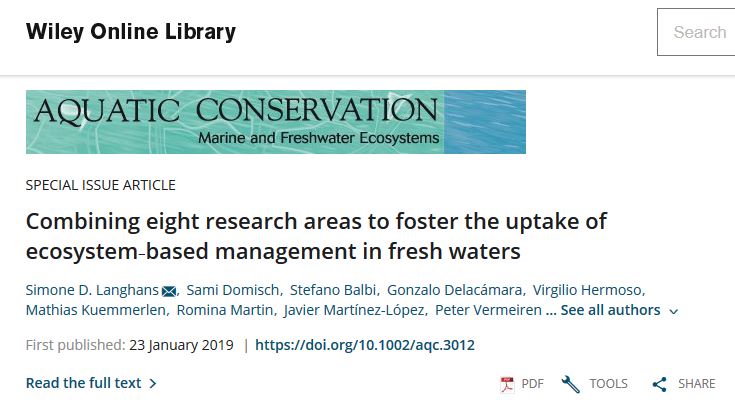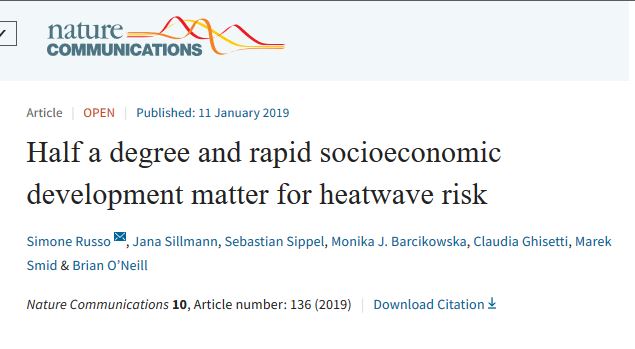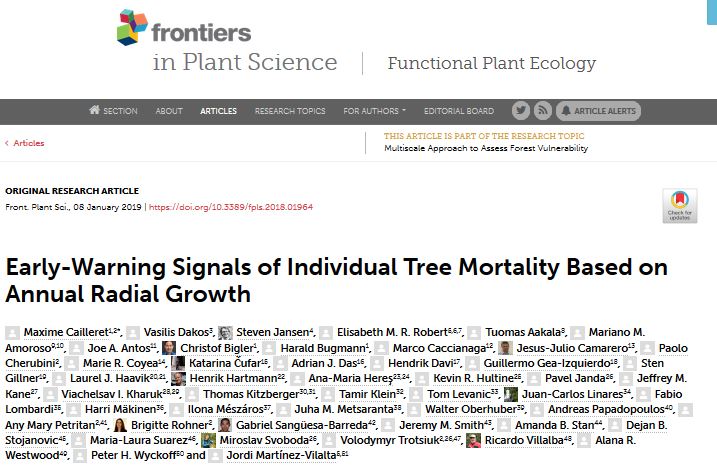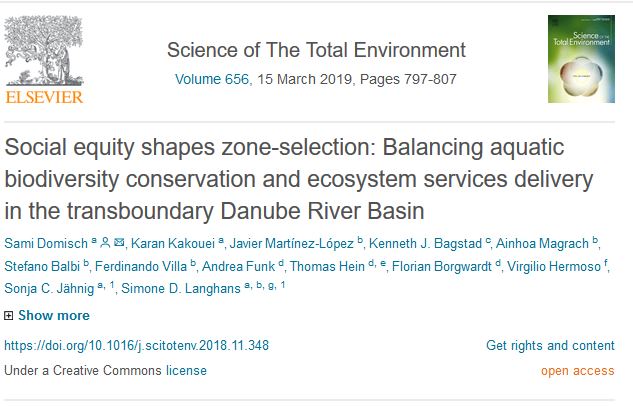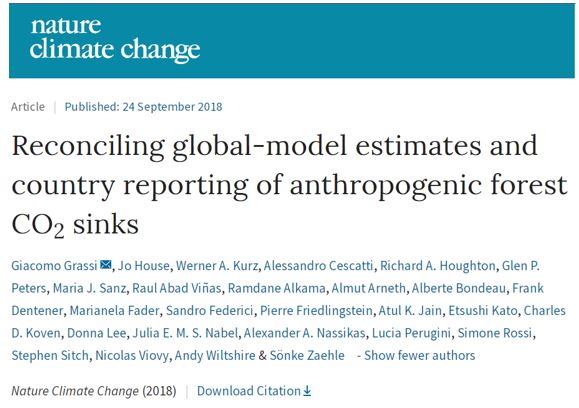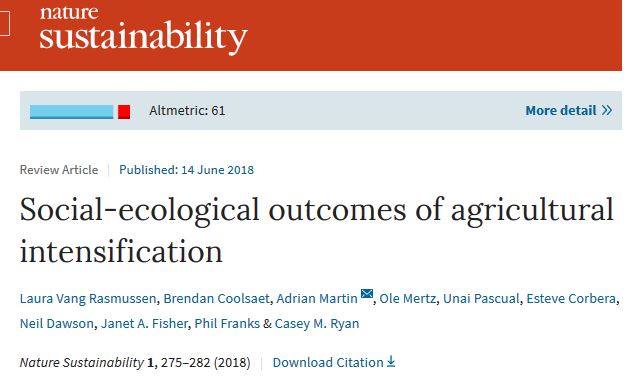Journal Articles
January 25, 2019
Published by BC3Research Simone Langhans Stefano Balbi Javier Martínez López Ferdinando Villa at January 25, 2019
Categories
Freshwater ecosystems are under a constant risk of being irreversibly damaged by human pressures that threaten their biodiversity, the sustainability of ecosystem services (ESs), and human well‐being. Despite the implementation of various environmental regulations, the challenges of safeguarding freshwater assets have so far not been tackled successfully.
Do you like it?
January 17, 2019
Published by BC3Research Marek Smid at January 17, 2019
Categories
While every society can be exposed to heatwaves, some people suffer far less harm and recover more quickly than others from their occurrence. Here we project indicators of global heatwave risk associated with global warming of 1.5 and 2 °C, specified by the Paris agreement, for two future pathways of societal development representing low and high vulnerability conditions.
Do you like it?
January 8, 2019
Published by BC3Research at January 8, 2019
Categories
Tree mortality is a key driver of forest dynamics and its occurrence is projected to increase in the future due to climate change. Despite recent advances in our understanding of the physiological mechanisms leading to death, we still lack robust indicators of mortality risk that could be applied at the individual tree scale. Here, we build on a previous contribution exploring the differences in growth level between trees that died and survived a given mortality event to assess whether changes in temporal autocorrelation, variance, and synchrony in time-series of annual radial growth data can be used as early warning signals of mortality risk.
Do you like it?
January 3, 2019
Published by BC3Research Noelia Zafracalvo Eneko Garmendia Unai Pascual Ignacio Palomo at January 3, 2019
Categories
The Convention on Biological Diversity Aichi Target 11 requires its 193 signatory parties to incorporate social equity into protected area (PA) management by 2020. However, there is limited evidence of progress toward this commitment. We surveyed PA managers, staff, and community representatives involved in the management of 225 PAs worldwide to gather information against 10 equity criteria, including the distribution of benefits and burdens, recognition of rights, diversity of cultural and knowledge systems, and processes of participation in decision-making.
Do you like it?
December 20, 2018
Published by BC3Research Ferdinando Villa Stefano Balbi Ainhoa Magrach Maria Almagro Javier Martínez López at December 20, 2018
Categories
Five new publications related to ARtificial Intelligence for Ecosystem Services (ARIES) applications have been recently published on a special issue of Science of the Total Environment. These publications have been developed by BC3 researchers Ferdinando Villa, Stefano Balbi, Ainhoa Magrach, María Almagro and Javier Mártinez, in collaboration with other researchers from other institutions belonging to the AQUACROSS project
Do you like it?
December 20, 2018
Published by BC3Research Javier Martínez López Ainhoa Magrach Stefano Balbi Ferdinando Villa Simone Langhans at December 20, 2018
Categories
Freshwater biodiversity is declining, despite national and international efforts to manage and protect freshwater ecosystems. Ecosystem-based management (EBM) has been proposed as an approach that could more efficiently and adaptively balance ecological and societal needs. However, this raises the question of how social and ecological objectives can be included in an integrated management plan. Here, we present a generic model-coupling framework tailored to address this question for freshwater ecosystems, using three components: biodiversity, ecosystem services (ESS), and a spatial prioritisation that aims to balance the spatial representation of biodiversity and ESS supply and demand.
Do you like it?
October 4, 2018
Published by BC3Research Javier Martínez López Stefano Balbi Ainhoa Magrach Marta Pascual Ferdinando Villa at October 4, 2018
Categories
Scientists, stakeholders and decision makers face trade-offs between adopting simple or complex approaches when modeling ecosystem services (ES). Complex approaches may be time- and data-intensive, making them more challenging to implement and difficult to scale, but can produce more accurate and locally specific results. In contrast, simple approaches allow for faster assessments but may sacrifice accuracy and credibility. The ARtificial Intelligence for Ecosystem Services (ARIES) modeling platform has endeavored to provide a spectrum of simple to complex ES models that are readily accessible to a broad range of users
Do you like it?
September 26, 2018
Published by BC3Research Maria Jose Sanz at September 26, 2018
Categories
Achieving the long-term temperature goal of the Paris Agreement requires forest-based mitigation. Collective progress towards this goal will be assessed by the Paris Agreement’s Global stocktake. At present, there is a discrepancy of about 4 GtCO2 yr−1 in global anthropogenic net land-use emissions between global models (reflected in IPCC assessment reports) and aggregated national GHG inventories (under the UNFCCC). We show that a substantial part of this discrepancy (about 3.2 GtCO2 yr−1) can be explained by conceptual differences in anthropogenic forest sink estimation, related to the representation of environmental change impacts and the areas considered as managed.
Do you like it?
June 21, 2018
Published by BC3Research Aline Chiabai Marc Neumann at June 21, 2018
Categories
The study aims to explore the main drivers influencing the economic appraisal of heat warning systems by integrating epidemiological modelling and benefit-cost analysis. To shed insights on heat wave mortality valuation, we consider three valuation schemes: (i) a traditional one, where the value of a statistical life (VSL) is applied to both displaced and premature mortality; (ii) an intermediate one, with VSL applied for premature mortality and value of a life year (VOLY) for displaced mortality; and (iii) a conservative one, where both premature and displaced mortality are quantified in terms of loss of life expectancy, and then valued using the VOLY approach. When applying these three schemes to Madrid (Spain), we obtain a benefit-cost ratio varying from 12 to 3700
Do you like it?
June 15, 2018
Published by BC3Research Unai Pascual at June 15, 2018
Categories
Land-use intensification in agrarian landscapes is seen as a key strategy to simultaneously feed humanity and use ecosystems sustainably, but the conditions that support positive social-ecological outcomes remain poorly documented. We address this knowledge gap by synthesizing research that analyses how agricultural intensification affects both ecosystem services and human well-being in low- and middle-income countries.
Do you like it?

